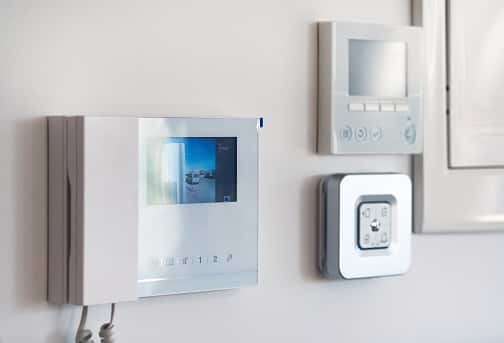Questions to ask a home security company
What to know before you buy

Installing a home security system helps protect your family, but it only works if you’re confident in the company you’ve chosen and the products and services it provides. By doing your homework and asking questions, you can rest easy knowing your home is secure. For more, read our guide to find the best home security companies.
Key insights
- One decision you’ll have to make when buying a security system is how you want the system monitored (professional vs. DIY).
- When you ask about cost, keep in mind that professional monitoring typically costs about $15 to $70 a month.
- Find a company that offers a comprehensive warranty and a contract that’s straightforward regarding who ultimately owns the equipment.
Installation and monitoring
Do you want a self-monitored or professionally monitored system? This affects both your costs and your daily experience with the system.
How is the system monitored?
Most security systems give you the option of self-monitoring or professional monitoring, and you should know your options and the associated costs before you sign a contract. Even self-monitoring systems sometimes charge a small monthly or annual fee. Professional monitoring is more expensive and requires a monthly fee, but you get 24/7 monitoring — the extra cost could be worth the peace of mind you receive.
The next question is how the system communicates with the monitoring station. Older systems used the home telephone line. The old copper-based telephone network was quite reliable and nearly always worked, even during power failures. The major weakness was that it was often easy for a burglar to find the telephone line running into a home and cut it, disabling the phone and the alarm.
Today, many homes use a cable television or internet connection for telephone service. Many others simply use their cell phones and don’t have any kind of landline. This complicates matters a little.
Except for older systems that still use the copper-based telephone network, there are two primary ways a system communicates with the monitoring station: a cellular communications network or your home’s Wi-Fi system, which relies on your internet connection.
What is the average response time to an alarm?
If you pay for professional monitoring, you’re counting on a team of responders who are available 24/7. When a sensor goes off, you want to know how long the company will take to send you a notification or alert emergency services. Ideally, this is done in less than a minute — in situations like these, every second counts. If the company can’t guarantee this response time, you may want to look elsewhere.
How is the system installed?
Many basic home security systems offer the option of self-installation, but others need to be professionally installed. If you’re installing the system yourself, ask about any resources and support the company may offer.
Even though these systems are designed to be simple for the average person to install, it’s nice to know you can ask questions if you have any problems. Check with the company to see if it offers free technical support. If you need or want professional installation, ask about the cost — it may or may not be included in the sticker price of the system.
Wireless home security systems are typically designed for do-it-yourself installation, while most hard-wired systems require a professional.
» COMPARE: Security system installation: DIY versus professional
Contracts and pricing
You want to go with a contract that fits your plans. Be sure to ask about contract lengths, cancellation policies and whether you own or lease the equipment.
What are the terms of my contract?
While the trend of two- and three-year contracts is slowly starting to abate, you may still have to sign a contract, and it’s essential you know what you’re signing. How long will you be legally obligated to keep paying for the system? What if you’re not satisfied with the services? What if you move? Are you allowed to move the equipment to your new house or will it negate the warranty?
Under some contracts, you lease the equipment and don’t actually own it. If you rent or know you may move in the near future, make sure you choose a company that lets you transfer service without breaking the contract.
How much does the system cost?
This question may seem like a no-brainer, but you need an idea of all costs associated with your system. Many systems are customized for your specific space, and the more sensors, security cameras and monitors you install, the larger your bill will be.
There may be additional charges for installation, maintenance and monitoring that you should factor in when budgeting. Typically you can expect to pay $15 to $70 a month for monitoring.
» MORE: How much does a home security system cost?
How long has your company been in business?
Just because a business is new doesn’t mean that it can’t provide quality service, but a company that has been around a while has the benefit of experience. You can also look at customer and professional reviews to get an idea of average customer satisfaction. If you need a large, complex system, choosing a security company with an established reputation may be your best bet.
Equipment
Another thing to think about is the equipment: sensors, smart controls and other components.
How many sensors do I need?
The number of sensors you need varies based on the layout of your home and how much security you feel you need. Some people opt for sensors only at their front and back doors, while others may want them in additional places like the garage, around windows or in the yard.
A good security company considers your property, budget and security risk and gives advice on how many sensors are reasonable.
What warranties do you offer?
Even the best equipment needs maintenance at some point, and you need to know whose responsibility that is when it happens. Make sure you ask what kind of warranty the equipment is under and what your costs will be after the warranty period is over.
Note that there might be different warranties given by the equipment manufacturer and the company you buy the equipment from. It’s also worth asking how long you’ll have to wait before a technician addresses a warranty concern. This should typically be done within a day or two of the malfunction.
How often do you test your equipment?
Most home security companies recommend you test your equipment at least once a month to ensure the sensors, cameras and alarms are working as they should. You can typically do this yourself, but you’ll want to have the equipment tested by a trained technician periodically.
What happens if I lose power?
The best alarm system is worthless if it doesn’t work when you need it. That means it needs to have backup power and a reliable method of communicating with the monitoring center.
Nearly all alarm systems today have battery backups that let them work even during a power failure. It’s important to know how long the system will run on battery power and how often the batteries need to be replaced. Most systems issue an alert when the battery is nearing the end of its life.
Do you offer home automation?
Home automation, or the ability to control your system through Wi-Fi with an app, is becoming more popular, and many security companies are offering this feature. These apps let you turn lights on and off, lock doors and monitor your security system. Because this relies on Wi-Fi, especially for video monitoring, you need a good internet connection for optimal performance.
With this service, you’ll also have to consider your online security and how to best protect yourself. The California Department of Consumer Affairs (DCA) recommends checking “whether the alarm company provides firmware, an encrypted network, or a strong firewall to prevent hackers from obtaining access to your video feed.” If these provisions are not in place, you run the risk of your video feed being hacked.
Bottom line
Burglaries are one of the most invasive property crimes. According to the FBI, the majority of burglaries involve forcible entry. Most of the time, the intruder will enter through a first-floor door or window. A security system is one way to deter burglars and keep your home safe, and knowing the right questions to ask helps you find the right system for you. For more, read our guide to find the best home security companies.
Article sources
- California Department of Consumer Affairs, “ Consumer Guide to Alarm Companies .” Accessed April 9, 2023.
You’re signed up
We’ll start sending you the news you need delivered straight to you. We value your privacy. Unsubscribe easily.
